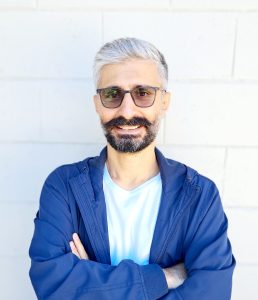KPSP Welcomes a Scholar of Literature from Iranian Kurdistan
Kurdish Political Studies Program (KPSP) is delighted to welcome Cyrus Amiri, Ph.D., as a visiting scholar in 2023. Amiri is an associate professor of English and Comparative Cultural Studies at the University of Kurdistan in Iran.

Could you tell us more about your background?
I was born in Kurdistan to a Kurdish family. I am trilingual in Kurdish, Persian and English. My doctoral thesis, completed at the University of Tehran, focused on diasporic Iranian literature in English, and studies Iranian authors who wrote fiction in English. My scholarly publications discuss how these authors draw on their own tradition and, in turn, how they influence their tradition, how they address the complicated issues of immigration and cultural differences.
What brought you to UCF?
I was impressed by the idea of the KPSP being the first and only academic program dedicated to the study of politics of Kurds and Kurdistan in the United States. I figured this would be the best place to continue my research and do more service to the Kurdish community and literature. I then contacted School of Politics, Security, and International Affairs Director Güneş Tezcür, Ph.D. who supported my decision to come to UCF. While many Kurdish authors are eager to write Kurdish stories and novels in Kurdish, they are also disappointed that there is not much audience for that work. My purpose at UCF is to build a greater understanding and awareness of diasporic Kurdish literature in English, which deserves greater academic recognition.
What activities will you be pursuing during your time at UCF?
I am currently connecting with Kurdish authors in the United States. I will then organize scholarly gatherings, both online and on campus, to bring these authors together and foster a sense of community. This will be beneficial not only for those authors but also for Kurdish authors in their homeland who often dream about their work to be translated into English. For them, having their work expressed in English is very important to have the voices and pain of the oppressed and marginalized people be heard by international audiences. I find that English literature and the English language are an opportunity for the Kurds to tell the world about their lives, the pains they are going through and the changes they are seeking in their political and social lives.
Will you be also working on some other projects at UCF?
Yes, I aim to publish a book about English fiction by Kurdish authors who are in the diaspora. I am particularly interested in reaching out to such authors in the United States. Overall, it would be a highly rewarding experience to have U.S. universities cultivate languages, cultures, and scholars from other parts of the world. In this sense, I find it very valuable that UCF has a certificate in Kurdish Studies and offers Kurdish language courses. I am excited to be part of the community here.
